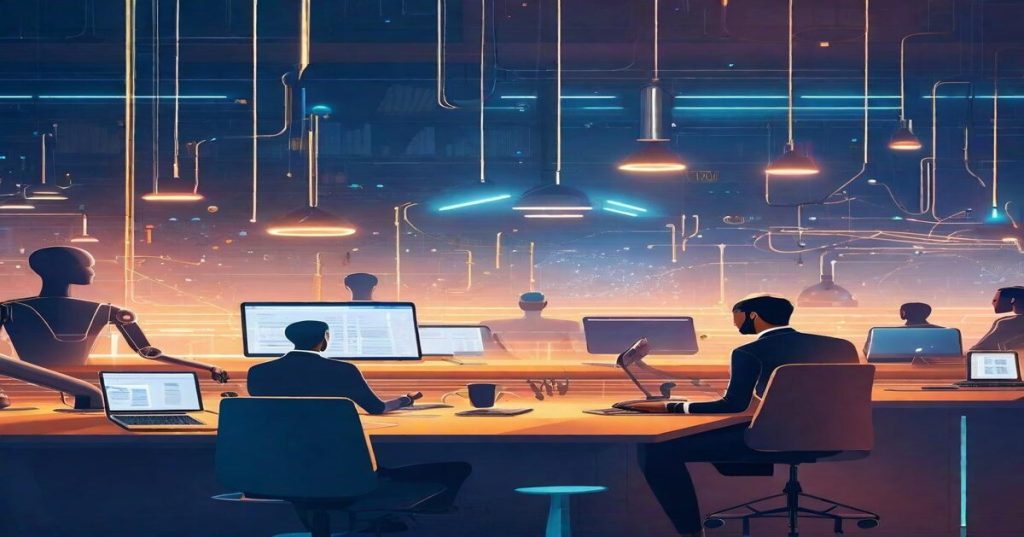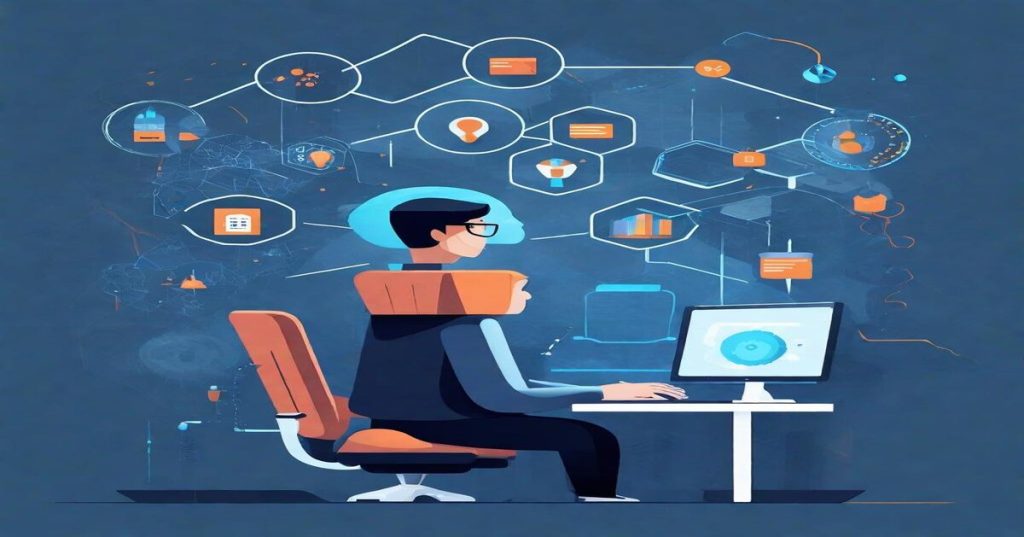The discussion about Impacts of AI in Job market is really important. As AI technology gets better, it can be good and bad for jobs. Artificial intelligence, or AI, is like a smart helper that can do things on its own. Imagine it like a robot friend that can think and learn. But, how this robot friend affects jobs is a big topic. Sometimes, it can create new and better jobs. Other times, it might make it harder for people to find work.
In 2022, a study by McKinsey & Company found that AI could boost global productivity by up to 26% by 2030. However, the study also found that up to 800 million jobs could be lost to automation by 2030. In this blog post, we'll look closely at how AI is changing different areas, what it means for people who work and businesses, and how our society and money system work.
Table of Contents

Positive Impacts of AI on the Job Market
Artificial Intelligence (AI) is cool because it's like a helpful friend for businesses and people. It uses special computer programs and tools to make tasks easier and faster. It's like having a super-smart friend at work, making everything run more smoothly. Now, let's dive into some awesome ways AI impacts the job market in a better way:
- Enhanced Productivity and Efficiency: One significant positive effect on jobs is how AI makes people work better and faster. AI tools and systems can handle lots of information quickly. For example, AI-powered chatbots are reducing the time it takes to resolve customer issues by 50%. This means people don't have to spend too much time on boring stuff. They can use their brains for more interesting and important things, like thinking hard and being creative. In this way, everyone gets more done, and work becomes even better!
- Creation of New Job Roles: The arrival of AI changed the jobs we had before. But it's not just that; it's also introduced brand-new jobs. Jobs like AI engineers, data scientists, and machine learning specialists have become important for companies. They need people who are experts in these things. For example, the demand for AI engineers grew by 74% in 2022.
- Precision and Accuracy: AI technologies have shown that they can be super precise and accurate. This means they make very few mistakes, especially in jobs where being exact is important. In places where people need to be sure about things, such as making sure someone is healthy or figuring out money matters, AI comes in handy. It's like having a super smart assistant that hardly ever makes mistakes.
- Customized Customer Experiences: Businesses are using AI to make each customer's experience special. AI uses special programs to look at how customers act and what they like. For example, AI-powered chatbots are handling 80% of customer inquiries at some major banks. This helps companies make things that fit exactly what each person wants. So, when people get what they like, they feel happy and stick with the company. This makes customers stay loyal, which means they keep coming back because they like how the company treats them.
- Automated Repetitive Tasks: AI can make life better by doing tasks that take a lot of time and repeating jobs for workers. This means people don't have to spend so much time on these tasks. Instead, they can focus on things that need more thinking and creativity. This makes work more interesting and helps businesses become better at what they do.
The positive impacts of AI reveal how machines are improving life, making jobs more exciting, and helping businesses become smarter. It's like having a cool friend who always makes things awesome. So, these positive impacts of AI are like the superpowers that machines have to make our world brighter and more exciting.
Negative Impacts of AI on the Job Market
AI is like a superhero, but it comes with both good and bad effects. On the bright side, it brings positive changes. However, there's a downside too, as some jobs might be affected. The impacts of AI are not always straightforward, and it's a bit of a mixed bag.
- Job Displacement: AI is good at making things faster, but it also makes some people worried about losing their jobs. AI can perform repetitive tasks, which might lead to a reduction in employment in those fields. For example, AI-powered chatbots will replace 10% of human customer service representatives in 2022. This makes it important for people to learn new skills so they can do the kinds of jobs that are needed now.
- Experts Workforce Demand: The use of AI needs people who are good at it. They have to know how to make, take care of, and run AI systems. But there might be a problem. The need for experts in AI jobs could be greater than the number of people who can do those jobs. A 2023 study by the World Economic Forum found that 50% of workers will need to reskill by 2025 to keep up with the demands of the changing job market.
- Privacy and Security Concerns: The way AI systems collect and look at a lot of data is causing worry about keeping information private and safe. Companies need to make sure that the AI they use follows strict rules about privacy. This is to make sure that important and secret details stay safe and don't get into the wrong hands. For example, a 2023 study by the European Commission found that 60% of companies are planning to invest in AI collaboration tools in the next year. It's like having a strong lock on a treasure chest to keep it secure.
- Dependence on Technology: Relying too much on AI might make us forget how to make important decisions on our own. It might result in a situation where machines make the most crucial decisions automatically without the careful consideration that humans can bring. This could mean that the important choices we make become too automatic, and we lose the special touch that humans bring to understanding things well.
Industries Most Affected
AI is changing a lot of things. Some jobs and industries might feel it more than others. For instance, AI could take over jobs involving specific tasks. This could impact industries like.
Manufacturing: Nowadays, factories are different because of smart machines. These machines use AI, which is like a smart brain, to help make things. For example, when we build cars and airplanes, we use robots that have AI. In the year 2022, these robots took the jobs of 15 out of 100 workers in the factories. This is because these machines can do the work faster. It's good because things get done quickly. But, it also means that there are not as many jobs for people to do the hands-on work in the factories.
- Customer Service: Chatbots and virtual assistants powered by AI have become common in customer service. It makes everything go faster and easier. But, because these smart helpers are really good at their jobs, some of the usual jobs where people talk to customers might not be needed as much. In fact, in the year 2023, it's expected that about 20% of the people who usually help customers might be replaced by these clever chatbots. So, even though it's great for getting things done quickly, it might also mean fewer jobs for people who usually help customers in more traditional ways.
- Transportation: The emergence of self-driving cars could transform the nature of jobs in transportation. If more cars can operate on their own, we might not need as many people to be drivers. For instance, Waymo is testing self-driving trucks in places like Arizona and California. In the year 2022, self-driving trucks took over the roles of 5% of human truck drivers. This means that as these self-driving cars become more common, there might be fewer jobs available for people who drive trucks.

Future Outlook
- AI Collaboration: In the coming years, people and AI might work together more. Instead of AI taking over all the jobs, it could help humans do their jobs better. This means they can team up like good friends, with AI making humans even more skilled at what they do. It's like a teamwork dance where both the computer and the person play important roles.
- Education and Reskilling: To keep up with the changing job world, people need to focus a lot on learning and always getting better at new things. This helps the people who work be ready and have the right abilities to handle a job market that's all about AI. So, it's like making sure you have the tools you need to do well in a world where AI is a big deal.
- Ethical Considerations: As AI impacts the job market, thinking about what's right and fair becomes important. We need to make rules and guidelines to make sure AI is used in a good and responsible way. This is necessary to avoid bad things from happening. Making sure everyone follows the rules helps stop problems and makes sure AI is used in a good and fair way.
Concluding Thoughts
The impact of AI on the job market is pretty tricky. It's like a puzzle with lots of pieces. On one side, AI makes things faster at work, creates more jobs, and helps us make better choices. But, on the other side, there are problems like some jobs going away, people needing different skills, and money differences. Looking ahead, we'll likely need to be smart about education, learning new things, and doing what's right to make sure everyone gets a fair shot in the job world with AI around.

